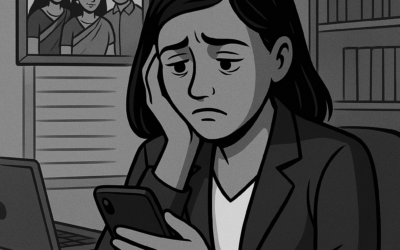This particular incident unfolded on a Sunday around 10 am, when the sun radiated as if it were noon. It was a crowded junction in the city, where six roads converge. The place was teeming with people, particularly around the vegetable and fruit shops. Each person was engrossed in their activities, seemingly indifferent to the occurrences around them. The small food eateries offering dosas, samosas, pooris, and fried sweets were unusually hectic as people eagerly sought to secure their breakfast.
In the midst of this lively scene, two children, Alpha and Beta, aged around nine, stood out. Clad in shabby, torn clothes, and exhibiting signs of malnourishment, with light hair indicating hypochromia, they stood at the junction entrance, keenly observing the crowd attempting to capture their attention.
At this moment, two young men, Abhi and his friend Abbu, both in their early twenties, had just finished breakfast and ventured into the market to purchase groceries for lunch. Abhi trailed behind his friend, navigating through street hawkers and the bustling crowd. Suddenly, the two kids entered the scene, their hands joined, actively seeking alms. To Abhi’s surprise, they approached him directly, seemingly oblivious to anyone else’s existed in the market.
What would you have done if you were in Abhi’s situation?

The Urge To Help
Upon witnessing the condition of the two children, Abhi felt compelled to help considering the sensitivity of their age and deciding not to give them money. Complicating matters, neither Abhi nor his friend Abbu was familiar with the local language, both hailing from distant states. Despite the language barrier, Abhi attempted to communicate his intention to offer food, repeatedly mentioning names like Idli, Dosa, Poori, and Kela (Banana), hoping for a discernible reaction. Noticing a change in the boys’ expressions upon hearing the word “kela,” Abhi thought he had an answer and decided to purchase bananas for them.
However, when he handed over the bundle of bananas, one of the boys promptly discarded it under a nearby four-wheeled cart, displaying a clear lack of interest. This unexpected action left Abhi confused. What might have been going through the boy’s mind?, Abhi thought. Would it be, “Why is he giving me a banana instead of cash?” or “Why are people being so cruel?” or “I have to do this for my survival.” The mystery of the boy’s unexpected response prompted Abhi to contemplate the complex emotions and struggles that the children faced in their daily lives.
If you were in Abhi’s place, what would your immediate reaction have been?
Rattled by the unexpected reaction of boys, Abhi found himself at a loss, staring at them while wondering what to do. As he walked back to his friend, one of the boys retrieved the discarded banana bundle from the ground and held onto it until both men were out of their line of sight. What do you think Abhi should have done?
The Complexity Of Kindness
Soon the men finished shopping. As they were returning to their room, they saw the rejected bananas were now being consumed by a four legged sacred animal of India – cow , and the boys were the ones feeding her. They looked happy.
- Should Abhi be angry with their behaviour, or
- Should he be satisfied that the bananas didn’t go waste
Abhi’s mixed emotions are understandable given the circumstances. Whether he should be angry or satisfied depends on his perspective and values. But he still couldn’t digest what had just happened. Upon reaching the room, he started ranting to his friend and that is when he told him, “It’s a huge business, the kids knew whom to target, and that was the reason why I wasn’t approached even though I was walking right in front of you.“
Abhi wondered if Abbu had prior experiences or knew about orchestrated scenarios involving beggars or individuals seeking alms. As Abhi started contemplating the situation and gradually realized the underlying truth, he began to question the authenticity of children’s actions. This process of introspection and questioning allowed Abhi to come back to his senses and understand the complexity of the situation, including the possibility of manipulation or deception.
Why did they throw the food?
Abhi realised that the children’s behaviour, prioritising money over food, might be a result of their training or upbringing. Recognising their young age, he understood that it wasn’t their fault and that they might lack guidance and positive influences in their lives.
Are they abandoned kids? Or were they really part of a group?
If they were really abandoned kids, wouldn’t they know the pain of hunger? If they had known the pain of hunger, would they have thrown the food? Or was their body able to adapt to starvation?
All these questions pointed in a different direction – they could be part of an organized syndicate. In simple words, the begging mafia which operates as a highly organised network. There are intricate hierarchies where intermediaries oversee and manage the child beggars. Handlers are responsible for controlling and monitoring their activities on the streets. Also disadvantaged families encourages their children to beg for alms (possibly only money).
Movie recommendation to get a glimpse on organized syndicate: Naan Kadavul
Abhi delved into the broader issue at hand and he wished to understand the societal factors which contributed to this. Poverty, disability, lack of opportunities, lack of support from family, etc. could be a few.
Turning to government data to understand the magnitude was in vain as the data is almost always factually incorrect. The population of India in 2021 was approximately 1.4 Billion. Out of this, there were about 4,89,773 beggars and vagrants. In reality, this number would be higher. According to another set of data, 41,290 children are in the age group of 0-14 years of age.
Who are these children?
- They are part of the syndicate
- Orphaned or abandoned by their family
- Part of a down and out family
The Intervention
What has the government done to alleviate this issue?
- Child Care Institutes (CCIs) – Rehabilitation homes which provide shelter, education and vocational training. Out of the 9589 CCI’s, 91% are being run by NGOs and the remaining 9% are government supported homes.
- Child welfare committees
Leaving the government interventions aside, what can we do when we encounter such children?
- Do we know what they really want?
- Will our efforts really help them?
- Will we be a saviour or oppressor or victim?
- Can we give them a better and a sustainable future?
- Will the efforts taken just to have a conversation and understand their side help?
- Can you offer non-monetary assistance and report it to the concerned officials?




I would have eaten half of the banana and shared the other half